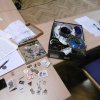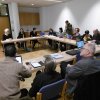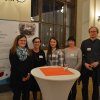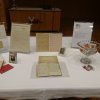Displaced Neighbors. Jews in Central Lower Austria - research and memory culture.
Based on private photos, documents and interviews the project participants looked into the lives and fates of the Jewish population in central Lower Austria before, during and after National Socialism.
The census of 1910 registered 921 people in St. Pölten and Central Lower Austria – the catchment area of the Jewish Religious Community (IKG) St. Pölten – professing themselves as Jews. National Socialists, however, also defined people as “Jewish” who had three Jewish grandparents. All of them were forced to “resettle” from St. Pölten to Vienna in June 1940. According to the latest research results 575 persons were murdered in the camps and ghettos.
This project invited all interested parties to look into the lives and fates of the Jewish population in central Lower Austria by using private photos, documents and memories. The work organisation was divided into two public events at the beginning and at the end, as well as six open workshops. In total about 70 people between the age of 17 and 83 years participated, including descendants of Jewish families. All events were held at the Catholic Bildungshaus St. Hippolyt in St. Pölten, which was able to address different target groups with its wide catchment area and its broad focus.
The scientific results of the project can be divided in two big areas: On the one hand, the participants brought documents and photos from their family archives, which were identified in the first step and digitised to secure them for a later evaluation. On the other hand, some of the participants shared partially already opened up family collections, whose richness and good preparation allowed an intensive research. The extensive estate of a family with Jewish members, which contained collectables from the Nazi era, and the documents of a Jewish family from Wilhelmsburg were particularly profitable. The results were presented at the final event on November 9th, 2017 and will be published online ensuring data protection. During the intense discussions in the workshops it became clear that still, 80 years after the "Anschluss", depending on the specific family history, it can not be talked about the Nazi period without stress and uncertainty. This finding is a valuable insight in the context of memory and dealing with the Nazi past. The commitment of the project participants gave the final impulse to set "Stones of Remembrance" from October 2018 onward for the victims of the Shoa at their last residential addresses in St. Pölten.



